When it comes to choosing the ideal freezer size for your family, there are several factors to consider. From the number of family members to your cooking habits and storage needs, finding the perfect balance is crucial. A freezer that is too small will leave you struggling to fit everything in, while a freezer that is too large may lead to wasted space and energy consumption. In this essay, we will explore the different factors that influence the ideal freezer size for your family.

First and foremost, the size of your family plays a significant role in determining the ideal freezer size. Larger families naturally require more storage space for food. If you have a large family with several members, you may want to consider a freezer with a capacity of at least 20 cubic feet. This size will provide ample space for storing a variety of food items, including meats, frozen vegetables, and leftovers. On the other hand, if you have a smaller family or live alone, a freezer with a capacity of around 10 to 15 cubic feet may be more than sufficient. It is important to strike a balance between having enough space and not wasting energy on an oversized freezer.
Secondly, your cooking habits and lifestyle play a crucial role in determining the ideal freezer size. If you enjoy cooking in bulk and freezing meals for later consumption, you will naturally require more freezer space. In this case, it may be beneficial to opt for a larger freezer size, even if you have a smaller family. This will allow you to store pre-prepared meals, homemade sauces, and other food items that can be conveniently reheated on busy days. Conversely, if you prefer cooking fresh meals every day or have a busy lifestyle that involves eating out frequently, a smaller freezer may suffice.
Another important consideration is the availability of additional storage options. If you have a pantry or garage with extra space, you may not need a large freezer in your kitchen. Utilizing additional storage areas can be a cost-effective solution that allows you to have a smaller, more energy-efficient freezer in the kitchen while still accommodating your family’s needs. This option also works well for families who purchase items in bulk or during sales, as they can easily transfer excess frozen goods to the extra storage area.
Furthermore, it is essential to take into account the layout of your kitchen or storage area. Measure the available space to ensure that the freezer you select can fit comfortably without obstructing pathways or other appliances. While a large freezer may provide more storage, it should not compromise the functionality and accessibility of your kitchen. Consider the dimensions of the freezer, including height, width, and depth, to ensure a seamless integration into your space.
Additionally, it is worth considering the energy efficiency of the freezer. Larger freezers tend to consume more energy, as they require more power to cool a larger space. This can result in higher electricity bills over time. On the other hand, smaller freezers are generally more energy-efficient, as they require less power to maintain the desired temperature. When choosing the ideal freezer size, strike a balance between your storage needs and energy efficiency to avoid unnecessary expenses.
In conclusion, finding the ideal freezer size for your family requires careful consideration of several factors: the size of your family, your cooking habits, available storage options, the layout of your kitchen, and the energy efficiency of the freezer. By assessing these factors, you can determine the optimal freezer size that will meet your family’s needs without wasting space or energy. Remember, it is always better to have a freezer that slightly exceeds your needs than one that falls short. With the right freezer size, you can efficiently store and preserve food, ensuring that your family’s needs are met while minimizing waste and maximizing convenience.